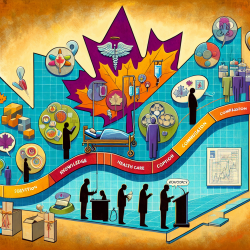The collection and use of human biological specimens (HBS) for research are crucial components of advancing medical science, particularly in regions like Sub-Saharan Africa (SSA), where genetic and genomic technologies are rapidly evolving. The systematic review titled "National ethics guidance in Sub-Saharan Africa on the collection and use of human biological specimens: a systematic review" provides valuable insights into the current state of ethical guidelines across SSA countries. This blog post explores how practitioners can enhance their skills by understanding these guidelines and encourages further research to bridge existing gaps.
The Importance of Ethical Guidance
Ethical and regulatory guidance is essential to ensure that research involving HBS is conducted responsibly and respects the rights and dignity of participants. In SSA, where biobanks and clinical trials are expanding, having robust ethical frameworks is vital for maintaining public trust and facilitating international collaborations.
Key Findings from the Review
- Of the 49 SSA countries, only 29 have some form of national ethics guidance.
- 17 countries provide specific language relating to HBS-related research, covering aspects like consent, ownership, reuse, storage, and transfer.
- The majority of active clinical trials involving HBS are concentrated in countries with more comprehensive ethical guidelines.
- Variability in regulations may hinder pan-African collaborations and require legislative action to align national policies.
Opportunities for Practitioners
Practitioners can leverage the findings of this review to improve their research practices by:
- Enhancing Knowledge: Understanding the existing ethical frameworks helps practitioners navigate complex regulatory landscapes effectively.
- Advocating for Policy Development: By identifying gaps in national guidelines, practitioners can advocate for stronger policies that support ethical research practices.
- Promoting Collaboration: Engaging with international initiatives like H3Africa can foster collaborations that adhere to high ethical standards.
- Implementing Best Practices: Adopting best practices from countries with robust guidelines can improve local research protocols.
The Path Forward: Encouraging Further Research
The review highlights significant gaps in ethical guidance across SSA. Practitioners are encouraged to conduct further research to address these gaps. Areas for exploration include:
- Developing Comprehensive Guidelines: Researching ways to create comprehensive national guidelines that cover all aspects of HBS collection and use.
- Cultural Considerations: Understanding cultural nuances that affect consent and participation in research studies.
- Interoperability Challenges: Investigating how different countries' regulations can be harmonized to facilitate cross-border research collaborations.
Conclusion
The systematic review provides a foundational understanding of the current state of ethical guidance on HBS in SSA. By enhancing their knowledge and advocating for stronger policies, practitioners can contribute to more ethical and effective research practices. As the field continues to evolve, ongoing efforts to address regulatory gaps will be crucial for advancing health outcomes across the region.
To read the original research paper, please follow this link: National ethics guidance in Sub-Saharan Africa on the collection and use of human biological specimens: a systematic review.










